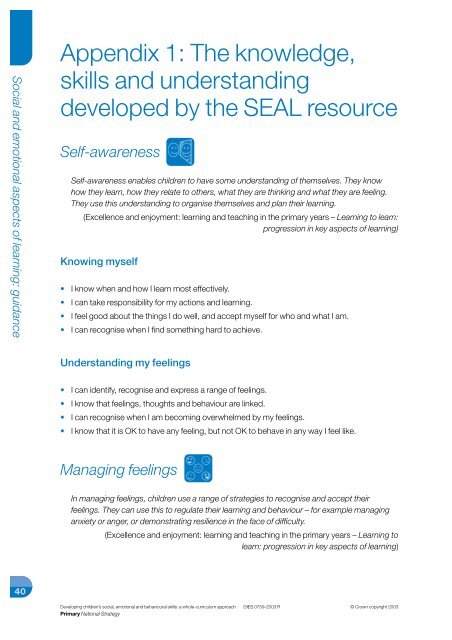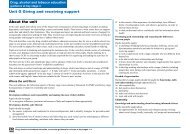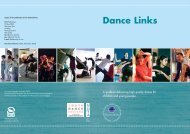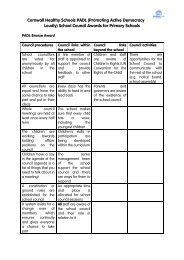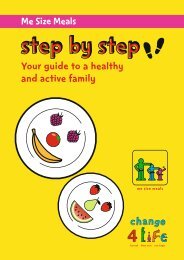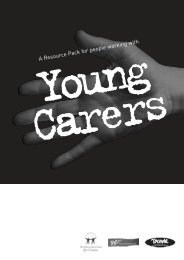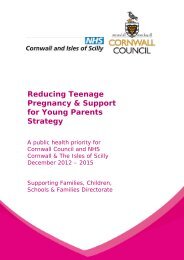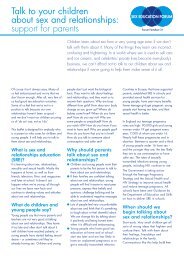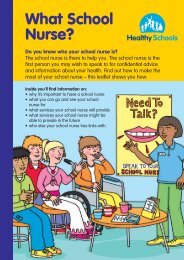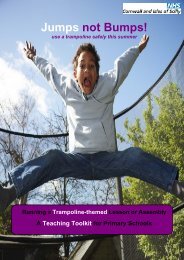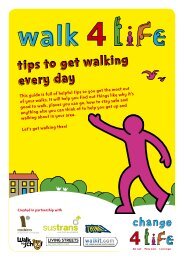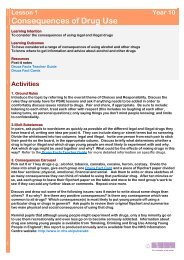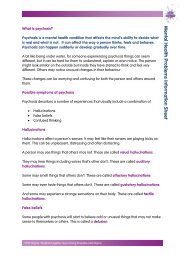Appendix 1 - Cornwall Healthy Schools
Appendix 1 - Cornwall Healthy Schools
Appendix 1 - Cornwall Healthy Schools
You also want an ePaper? Increase the reach of your titles
YUMPU automatically turns print PDFs into web optimized ePapers that Google loves.
Social and emotional aspects of learning: guidance<br />
<strong>Appendix</strong> 1: The knowledge,<br />
skills and understanding<br />
developed by the SEAL resource<br />
Self-awareness<br />
Self-awareness enables children to have some understanding of themselves. They know<br />
how they learn, how they relate to others, what they are thinking and what they are feeling.<br />
They use this understanding to organise themselves and plan their learning.<br />
(Excellence and enjoyment: learning and teaching in the primary years – Learning to learn:<br />
progression in key aspects of learning)<br />
Knowing myself<br />
• I know when and how I learn most effectively.<br />
• I can take responsibility for my actions and learning.<br />
• I feel good about the things I do well, and accept myself for who and what I am.<br />
• I can recognise when I find something hard to achieve.<br />
Understanding my feelings<br />
• I can identify, recognise and express a range of feelings.<br />
• I know that feelings, thoughts and behaviour are linked.<br />
• I can recognise when I am becoming overwhelmed by my feelings.<br />
• I know that it is OK to have any feeling, but not OK to behave in any way I feel like.<br />
Managing feelings<br />
In managing feelings, children use a range of strategies to recognise and accept their<br />
feelings. They can use this to regulate their learning and behaviour – for example managing<br />
anxiety or anger, or demonstrating resilience in the face of difficulty.<br />
(Excellence and enjoyment: learning and teaching in the primary years – Learning to<br />
learn: progression in key aspects of learning)<br />
40<br />
Developing children’s social, emotional and behavioural skills: a whole-curriculum approach DfES 0759-2003 R © Crown copyright 2003<br />
Primary National Strategy
Managing how I express my feelings<br />
• I can stop and think before acting.<br />
• I can express a range of feelings in ways that do not hurt myself or other people.<br />
• I understand that the way I express my feelings can change the way other people feel.<br />
• I can adapt the way I express my feelings to suit particular situations or people.<br />
Managing the way I am feeling<br />
• I can calm myself down when I choose to.<br />
• I have a range of strategies for managing my worries and other uncomfortable feelings.<br />
• I have a range of strategies for managing my anger.<br />
• I understand that changing the way I think about people and events changes the way I feel<br />
about them.<br />
• I can change the way I feel by reflecting on my experiences and reviewing the way I think<br />
about them.<br />
• I know that I can seek support from other people when I feel angry, worried or sad.<br />
• I know what makes me feel good and know how to enhance these comfortable feelings.<br />
Motivation<br />
Social and emotional aspects of learning: guidance<br />
Motivation enables learners to take an active and enthusiastic part in learning. Intrinsically<br />
motivated learners recognise and derive pleasure from learning. Motivation enables learners<br />
to set themselves goals and work towards them, to focus and concentrate on learning, to<br />
persist when learning is difficult and to develop independence, resourcefulness and personal<br />
organisation.<br />
(Excellence and enjoyment: learning and teaching in the primary years – Learning to learn:<br />
progression in key aspects of learning)<br />
Setting goals and planning to meet them<br />
• I can set a challenge or goal, thinking ahead and considering the consequences for others<br />
and myself.<br />
• I can break a long-term plan into smaller achievable steps, plan to overcome obstacles, set<br />
success criteria and celebrate when I achieve them.<br />
41<br />
© Crown copyright 2005 DfES 1378-2005 Social and emotional aspects of learning: guidance<br />
Primary National Strategy
Persistence and resilience<br />
Social and emotional aspects of learning: guidance<br />
• I can choose when and where to direct my attention, concentrate and resist distractions for<br />
increasing periods of time.<br />
• I know and can overcome some barriers to my learning such as feelings of boredom and<br />
frustration and know when to keep trying or try something different.<br />
• I can bounce back after a disappointment or when I have made a mistake or been<br />
unsuccessful.<br />
Evaluation and review<br />
• I know how to evaluate my learning and use this to improve future performance.<br />
Empathy<br />
Being able to empathise involves understanding others; anticipating and predicting their<br />
likely thoughts, feelings and perceptions. It involves seeing things from another’s point of<br />
view and modifying one’s own response, if appropriate, in the light of this understanding.<br />
(Excellence and enjoyment: learning and teaching in the primary years – Learning to learn:<br />
progression in key aspects of learning)<br />
Understanding the feelings of others<br />
• I can recognise the feelings of others.<br />
• I know that all people have feelings but understand that they might experience and show<br />
their feelings in different ways or in different circumstances.<br />
• I can understand another person’s point of view and understand how they might be feeling.<br />
Valuing and supporting others<br />
• I value and respect the thoughts, feelings, beliefs and values of other people.<br />
• I can be supportive to others and try to help them when they want it.<br />
• I know that my actions affect other people and can make them feel better or worse.<br />
42<br />
Social and emotional aspects of learning: guidance DfES 1378-2005 © Crown copyright 2005<br />
Primary National Strategy
Social skills<br />
Social skills enable children to relate to others, take an active part in a group, communicate<br />
with different audiences, negotiate, resolve differences and support the learning of others.<br />
(Excellence and enjoyment: learning and teaching in the primary years – Learning to learn:<br />
progression in key aspects of learning)<br />
Belonging to a community<br />
• I feel that I belong to and am valued in my class, school and community.<br />
• I understand and accept my rights and responsibilities in school, and know how I can take<br />
responsibility for making the school a safe and fair place for everyone.<br />
Friendships and other relationships<br />
• I know how to be friendly – I can look and sound friendly, be a good listener, give and receive<br />
compliments and do kind things for other people.<br />
• I recognise ‘put-downs’ and know how they affect people, so I try not to use them.<br />
• I can make, sustain and break friendships without hurting others.<br />
Working together<br />
Social and emotional aspects of learning: guidance<br />
• I can work well in a group, cooperating with others to achieve a joint outcome.<br />
• I can tell you what helps a group to work well together.<br />
Resolving conflicts<br />
• I can resolve conflicts to ensure that everyone feels positive about the outcome.<br />
Standing up for myself<br />
• I can be assertive when appropriate.<br />
Making wise choices<br />
• I can solve problems by thinking of all the options, identifying advantages and<br />
disadvantages, choosing a solution and evaluating it later on.<br />
• I can make a wise choice with work or behaviour.<br />
43<br />
© Crown copyright 2005 DfES 1378-2005 Social and emotional aspects of learning: guidance<br />
Primary National Strategy


